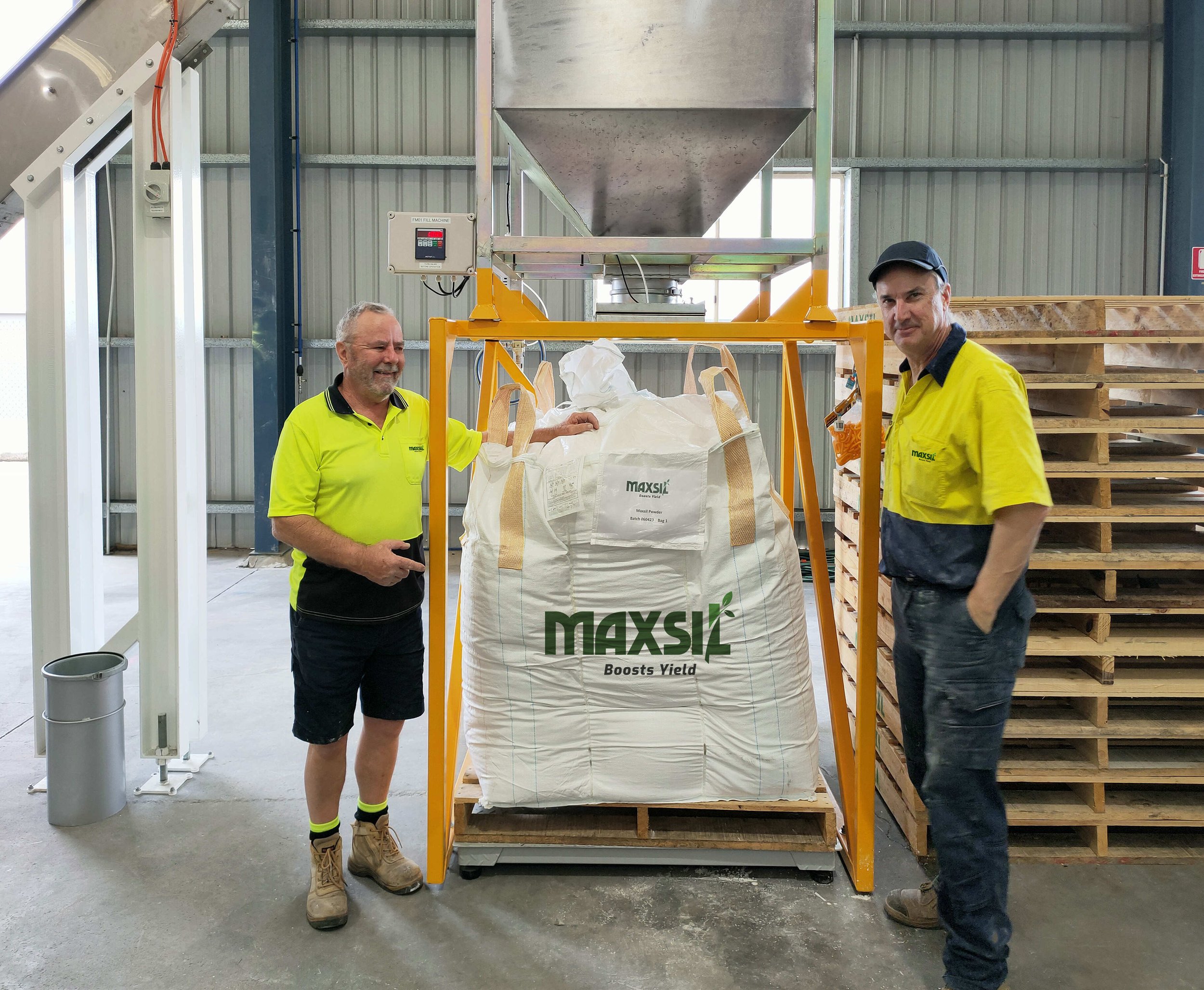A Win-Win for Australian Agriculture and the Environment
Managing Director David Archer and Operations Manager, Michael Trutwin at the Brendale factory with the first one tonne bag of MaxSil™ silicon fertiliser produced in early April .
MaxSil Pty Ltd (MaxSil) is pleased to announce that its processing plant in Brendale, Qld commenced production of its patented silicon fertiliser MaxSil™ in April.
Background
The MaxSil™ product is made using recycled container glass composed of amorphous silica, which in turn is processed into an extremely effective plant nutrient.
It was discovered in 2014 by the Managing Director David Archer. It has been continually refined and improved over the past nine years to the extent that it is now amongst the top four silicon-based plant nutrients in the world.
The MaxSil™ product is comprised of amorphous (non-crystalline) silica and poses none of the health risks associated with crystalline silicas such as quartz sand.
The company has patents across three continents and seven countries, has been recognised with a Federal Government Grant of $380,000 and has been a finalist for the Banksia Environmental Awards.
Despite supply chain and Covid issues, the bulk of the machinery for the manufacturing plant arrived in November 2022 and commissioning was completed by the end of March 2023.
Benefits of silicon
The benefits of silicon as a plant nutrient have been recognised by both scientists and growers. Even though silicon is a ubiquitous element in the Earth’s crust in the form of “silica” or SiO2 (e.g., quartz sand or silicates), these sources do not yield free silicon ready for plant uptake. The silicon content of most commercial soils is depleted, and this can be boosted by adding silicon fertilisers which release Plant Available Silicon or “PAS”. In turn, this increases crop yield by protecting plant growth from so-called abiotic stresses such as drought, frost, salinity, alkalinity and heat as well as having the potential to alleviate biotic stresses such as pests, fungus, bacteria and viruses.
The patented MaxSil™ fertiliser yields some 10 to 20 times more PAS than comparable products used in broad acre farming thus reducing transport and farm spreading costs. This in turn reduces Maxsil’s carbon footprint whilst increasing farm efficiencies.
The benefits of MaxSil™ have previously been confirmed by extensive field trials on sugar cane, potato, grains, avocado, tomato, capsicum, spinach, and strawberries to name a few.
A recent demonstration showed that application of MaxSil™ on condemned saline soils in W.A. was able to restore soil conditions to facilitate the growth of a healthy barley crop. Ongoing trial work from a farm services group in the Northern wheat belt in NSW has corroborated the results in W.A. These ground-breaking results suggest good prospects for other regions experiencing salt affected soils, a major problem for Australian agriculture.
MaxSil is committed to further research through an agreement with the University of Western Australia, multiple farm trials in various areas of W.A. to test efficacy on both saline and acid soils, and replicated trials by certified service providers, again on saline and acid soils.
Market
The timing for launching MaxSil™ appears favourable as agri business is in good shape. There is growing interest in silicon fertilisers amongst growers which coincides with a surge in publications by the scientific community. Science clearly shows that silicon is an essential element for plant growth and health.
MaxSil™ is a product for our times: it boosts crop production and promotes plant health and growth and reduces the requirement for NPK fertilisers as well as that of pesticides and insecticides.

